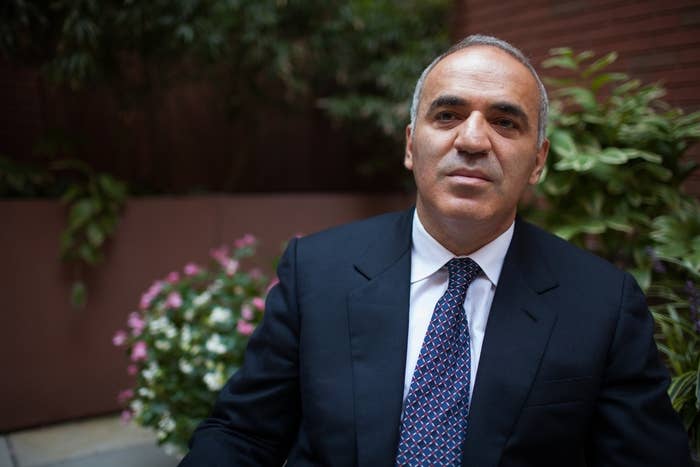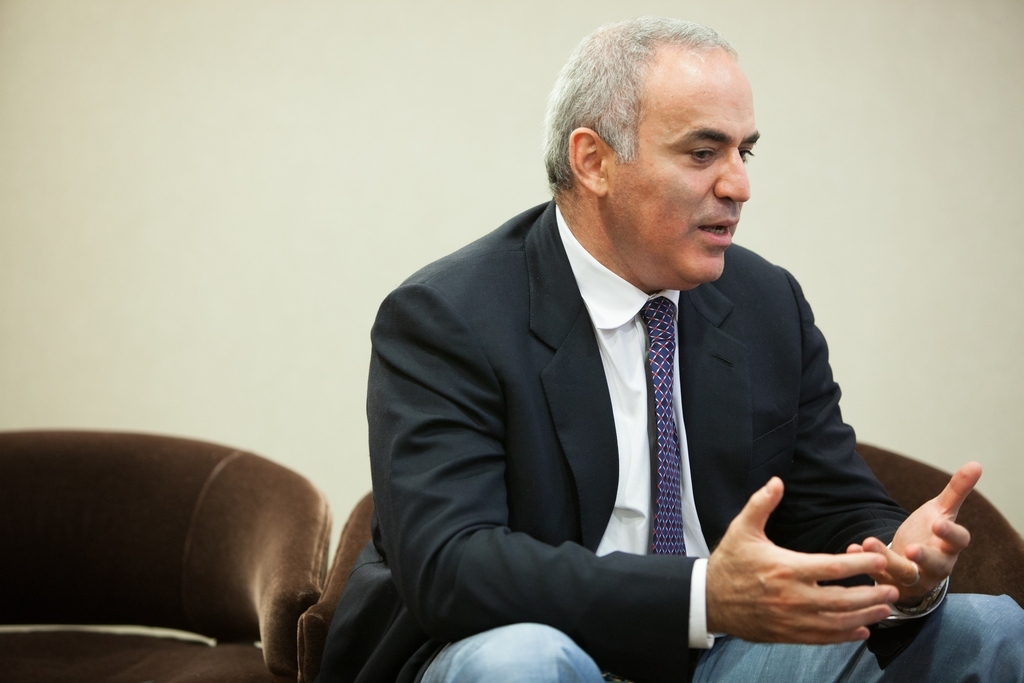
One phone call was all it took to scare Garry Kasparov out of Russia for good. He didn't even have to hear it himself. The retired Soviet-era grandmaster was briefing fellow activists in a hotel conference room in eastern Moscow when investigators called his elderly mother looking to interrogate him as a witness.
Kasparov had almost nothing to do with the case, which accuses a jailed anti-capitalist activist, Leonid Razvozzhayev, of giving false evidence against an investigator he says was part of a team that kidnapped and tortured him. But he didn't think that'd stop the feared Investigative Committee, a powerful and politicized law enforcement body at the heart of Russia's crackdown on dissent.
"You are asked to 'come as a witness.' You can leave as a suspect." Kasparov told BuzzFeed in a recent interview. "It's so tempting for them. You want to stay in this country, Mr. Kasparov? You can stay with us."
Once a national hero for his chess exploits — many consider him the greatest player in the history of the sport — Kasparov, 50, now doesn't think he can return to Russia as long as Vladimir Putin rules it. Spooked by the February phone call and convinced that fighting the Kremlin in Russia is a hopeless case, Kasparov made the itinerant lifestyle he has led for several years — he says he hasn't made a penny in Russia since 2007 — permanent. Instead of railing against Putin from the streets of Moscow, he confines his critique to op-eds and American television appearances while lobbying for Western governments to sanction corrupt Russian officials. He attempted to run for president of Russia in 2008, but gave up after authorities blocked efforts to hold a nominating convention; for now, he is confining his ambitions to the presidency of FIDE, the World Chess Federation, which he announced a bid for Monday.
Russian opposition politicians have filibusters, too. But we have to stand in the street and it ends when the police drag us away.

Garry Kasparov
@Kasparov63
Russian opposition politicians have filibusters, too. But we have to stand in the street and it ends when the police drag us away.

In Putin's Russia defying laws of a corrupt dictatorship shouldn't be treated as simple criminality. US not the same, but keep it in mind.

Garry Kasparov
@Kasparov63
In Putin's Russia defying laws of a corrupt dictatorship shouldn't be treated as simple criminality. US not the same, but keep it in mind.
His global soapbox is something the anti-Putin movement certainly needs. Kasparov is by far the most famous Russian opposition activist worldwide and the only one with an English-language media presence, recently culminating in a full-throated embrace of Twitter. It's also a distinct change in tactics for Kasparov, who entered politics in 2005 vowing to "restore democracy" through a series of dissidents' marches in Moscow. But with Putin's approval ratings in the sixties, the opposition for years failed to attract more than a few hundred supporters to each march. When mass protests unexpectedly broke out in December 2011, leaders of the various ideological factions Kasparov had long strove to unite against Putin spent most of their time squabbling with each other, and the movement fizzled out.
Kasparov now admits that he sees no way to challenge the Kremlin within Russia. "There is no chance — maybe my imagination is very poor — that Putin's power can be broken by the ballot," he says. Opposition tactics are "not creating any results." Running for office is "futile" as long as the Kremlin is calling the shots. "Putin's dictatorship is different. It's not Gadhafi, it's not Stalin. He needs to understand the nature of these semi-democratic procedures," he says. "Do we need elections? Yes. But we cannot pretend that something is going to be decided there," he adds.
Exactly what would happen to Kasparov if he returned is unclear. According to the independent website Gazeta.ru, investigators called Kasparov's mother in February after a fellow activist, Ilya Yashin, called for Western countries to sanction the investigator whom Razvozzhayev, the jailed activist, accused of torturing him. Several other activists present at the opposition meeting were also summoned and asked to identify Yashin on a recording of the meeting. Kasparov vehemently denied emigrating in April, then admitted two months later in Geneva that he had decided not to return to Russia "for some time." Investigators said they had never summoned Kasparov and were completely uninterested in him. According to Kasparov's mother, he had planned to be out of the country between February and mid-September, shortly before he sat down with BuzzFeed, anyway. "Under the current circumstances," he now says, "I can hardly imagine returning if Putin stays in power."
Some activists accused Kasparov of cowardice for fleeing at the first sign of trouble. Exiles from Russia tend to come from minority groups, especially Chechens, fleeing police persecution, or left-wing activists, whom investigators have singled out for particular attention. Sergei Guriev, a liberal economist with friends in high places who emigrated shortly before Kasparov, was subject to a sustained harassment campaign including intimidating interrogations, intrusive searches, and heightened border controls. Kasparov himself has been arrested several times at demonstrations and repeatedly targeted by pro-Kremlin youth groups.
Reasonable? A dangerous word! If I had listened every time I was told to calm down and be reasonable I would have achieved very little!

Garry Kasparov
@Kasparov63
Reasonable? A dangerous word! If I had listened every time I was told to calm down and be reasonable I would have achieved very little!

In chess we have a clock & if you run out of time you lose, regardless of the position. In life, too, time too often overrules quality.

Garry Kasparov
@Kasparov63
In chess we have a clock & if you run out of time you lose, regardless of the position. In life, too, time too often overrules quality.
In Kasparov's mind, however, it's the spectacle of a crackdown that constitutes the real danger. Two dozen rank-and-file Moscow activists are facing charges for participating in a protest that turned violent last May; many of them have been in jail for over a year, first awaiting and now on trial. "The regime is not going after everybody. That's their real strength," he says in quick English. "They don't use axe. They use scalpel. They know how to, sort of, pinpoint to create the maximum damage."
Kasparov is quizzical when asked how he feels about exile and when he expects to return. At one point he says: "Putin is in power for 30 years, and everyone knows that." At another, he expresses optimism that his exile is "temporary." He doesn't feel his wealth and fame protect him in Russia, but they do allow him to live the lifestyle of a latter-day White Russian, the prosperous educated class that settled in Europe after the Russian Revolution of 1917 that ushered in communist rule. He shares a home on Manhattan's Upper West Side with his third wife and youngest daughter while jetting around the world to give decision-making seminars and run chess education programs. And he continues to campaign against Putin from afar, attacking him in the media on subjects from Syria to Sochi and lobbying for the European Union to introduce sanctions on corrupt officials similar to those Congress passed last year.
"That's doing damage," he says. "What else can I add being there in Russia? There's a huge risk that I will be locked in the country and my passport will be taken away. They don't have to put me in jail. I'm an easy target. And who's going to pay attention to that? It rules my life, and they know that."
Failure often comes from setting incredibly high goals and thus should not be called failure at all. Many smaller successes on the way.

Garry Kasparov
@Kasparov63
Failure often comes from setting incredibly high goals and thus should not be called failure at all. Many smaller successes on the way.
